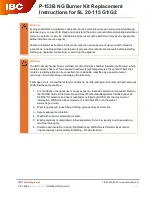
Installation & Operation Manual
4
The Knight Wall Mount Boiler - How it works...
1. Stainless steel heat exchanger
Allows system water to flow around specially designed
tubes for maximum heat transfer, while providing
protection against flue gas corrosion.
2. Combustion
chamber
access
cover
Allows access to the combustion side of the heat
exchanger.
3. Blower
The blower pulls in air and gas through the venturi (item
5). Air and gas mix inside the blower and are pushed into the
burner, where they burn inside the combustion chamber.
4. Gas
valve
The gas valve senses the negative pressure created by the
blower, allowing gas to flow only if the gas valve is
powered and combustion air is flowing.
5. Venturi
The venturi controls air and gas flow into the burner.
6. Flue gas sensor (limit rated)
This sensor monitors the flue gas exit temperature. The control
module will modulate and shut down the boiler if flue gas
temperature gets too hot. This protects the flue pipe from
overheating.
7. Boiler outlet temperature sensor (housed with high
limit
sensor)
This sensor monitors boiler outlet water temperature (system
supply). If selected as the controlling sensor, the control
module adjusts boiler firing rate so the outlet temperature is
correct.
8. Boiler
inlet
temperature
sensor
This sensor monitors return water temperature (system
return). If selected as the controlling sensor, the control
module adjusts the boiler firing rate so the inlet temperature is
correct.
9. Temperature and pressure gauge (field installed, not
shown)
Monitors the outlet temperature of the boiler as well as the
system water pressure.
10. Electronic LCD display
The electronic display consists of 4 buttons, a navigation dial
and a multiple line liquid crystal display.
11. Flue pipe adapter
Allows for the connection of the PVC vent pipe system to the
boiler.
12. Burner (not shown)
Made with metal fiber and stainless steel construction,
the burner uses pre-mixed air and gas and provides a
wide range of firing rates.
13. Water outlet (system supply)
The water outlet is the water connection for water leaving the
boiler and entering the system.
14. Water inlet (system return)
The water inlet is the water connection for water entering the
boiler from the system.
15. Gas connection pipe
Threaded pipe connection. This pipe should be
connected to the incoming gas supply for the purpose of
delivering gas to the boiler.
16. SMART SYSTEM Control Module
The SMART SYSTEM Control responds to internal and
external signals and controls the blower, gas valve, and pumps
to meet the heating demand.
17. Air intake adapter
Allows for the connection of the PVC air intake pipe to
the
boiler.
18. High voltage junction box
The junction box contains the connection points for the line
voltage power and all pumps.
19. Low voltage connection board
The connection board is used to connect external low voltage
devices.
20. Low voltage wiring connections (knockouts)
Conduit connection points for the low voltage
connection
board.
21. Condensate drain connection
Connects the condensate drain line.
22. Access door
Provides access to all internal components.
23. Ignition electrode
Provides direct spark for igniting the burner.
24. Flame inspection window
The quartz glass window provides a view of the burner
surface and flame.
25. Gas shutoff switch
An electrical switch designed to cut power to the gas valve to
prevent releasing any gas.
26. High limit sensor (housed with outlet sensor)
Device that monitors the outlet water temperature. If the
temperature exceeds its setting, it will break the control circuit,
shutting the boiler down.
27. Relief valve
Protects the heat exchanger from an over pressure condition.
The relief valve provided with the unit is set at 30 psi.
28. Flame sensor
Used by the control module to detect the presence of burner
flame.
29. Line voltage wiring connections (knockouts)
Conduit connection points for the high voltage junction box.
30. Transformer
The transformer provides 24V power to the integrated control.
31. ModBus
The optional ModBus option provides intelligent building
system
communications.
32. On/Off switch
The On/Off switch is used to turn 120 VAC on and off to the
unit.
33. Manual air vent
Allows for removal of trapped air from the heat exchanger.





































